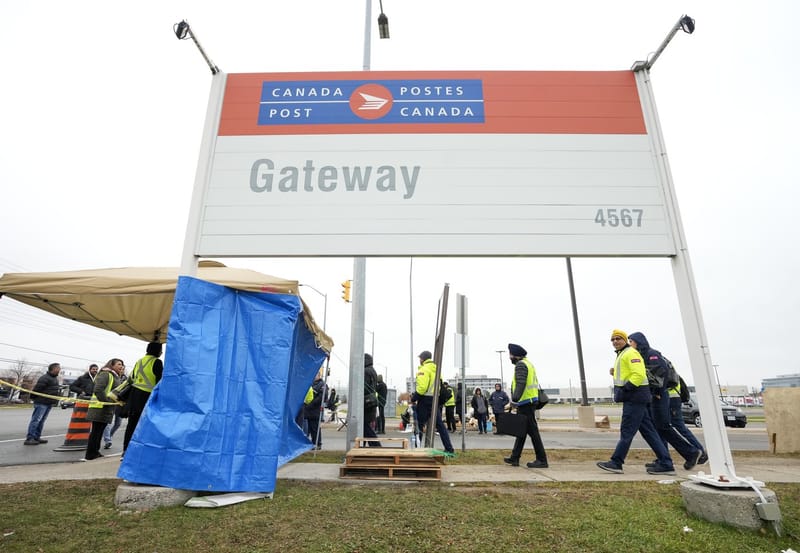Canadian Lawyers Say Online Posts Could Face UK-Style Convictions
In Canada, online comments have also been penalized under current Criminal Code provisions, although the convicted individuals in those cases typically operated websites or committed crimes beyond social media postings.

A woman in the UK has been sentenced to 15 months in prison for a Facebook post under the country’s new Online Safety Act, which is similar to Canada’s proposed Online Harms Act.
The UK law, enacted in 2023, will fully come into effect next year, but the provisions regarding “false and threatening communications” were implemented on January 31 this year and are already being enforced.
In addition, two men have received prison sentences of 20 and 38 months, respectively, for their online comments related to recent riots across the UK, which focused on immigration issues.
The judges found them guilty of “stirring up racial hatred” as per the Public Order Act of 1986.
These cases demonstrate that jail time for social media posts can result from existing laws, not just the new Online Safety Act.
In Canada, online comments have also been penalized under current Criminal Code provisions, although the convicted individuals in those cases typically operated websites or committed crimes beyond social media postings.
The potential legal consequences for online posts in Canada might change if Bill C-63 passes. This bill includes the Online Harms Act and amendments to the Criminal Code.
It was introduced in February and received its second reading in June before Parliament adjourned for the summer.
Lawyers Marty Moore and Josh Dehaas suggest that Canada might see similar convictions to those in the UK, although there are notable differences between the two countries' laws.
The Case of Julie Sweeney
Julie Sweeney, 53, from Cheshire County in northwestern England, was sentenced on August 14 to 15 months in prison for a post in a local Facebook community group.
The post contained a photo of individuals repairing a mosque in Southport, Merseyside, which had been damaged by rioters. Sweeney commented, “It’s absolutely ridiculous.
Don’t protect the mosque. Blow the mosque up with the adults in it.”
Following the riots in the UK in late July and early August, which were fueled by false online claims about a suspect in the stabbing death of three children being a Muslim asylum seeker, online activity has become a key focus for law enforcement.
Rioters targeted mosques and hotels housing asylum seekers.
UK authorities are targeting those spreading misinformation as well as those inciting hatred and violence through online posts.
Sweeney was convicted under the Online Safety Act’s offence of threatening communications, which involves sending messages that “convey a threat of death or serious harm,” and where the sender either intends to incite fear or is “reckless as to whether an individual encountering the message would fear that the threat would be carried out.”
Judge Steven Everett, who sentenced Sweeney, remarked that “even people like you need to go to prison” and emphasized the need to “take responsibility for their language, particularly in the context of the disorder that was going on around the country.”
Sweeney, who is the primary caregiver for her husband and has no previous criminal record, faces this consequence.
According to Dehaas, counsel with the Canadian Constitution Foundation, Sweeney’s comment might be considered “advocating genocide” under existing Canadian law.
“I believe that, based on the test for advocating genocide, it’s possible she could be found guilty in Canada,” Dehaas told The Epoch Times.
“Such acts are already illegal in Canada, and she could face years in prison, similar to the situation in the UK.”
The Criminal Code of Canada defines genocide as acts committed with the intent to destroy, either in whole or in part, any identifiable group.
This includes (a) killing members of the group or (b) deliberately inflicting conditions calculated to lead to the group's physical destruction.
Bill C-63 proposes increasing the maximum penalty for advocating genocide to life imprisonment, up from the current five-year maximum.
Dehaas noted that charges for advocating genocide are rare in Canada and require approval from the attorney general or their designate.
Similarly, UK charges under the Public Order Act of 1986 also need the attorney general’s consent and have been applied to individuals for social media posts related to the riots.
Moore, the litigation director at the Justice Centre for Constitutional Freedoms, agreed that someone like Sweeney could be prosecuted in Canada.
“Such language would likely be investigated and prosecuted under our current Criminal Code prohibitions,” he told The Epoch Times.
Bill C-63 would not only make life imprisonment the maximum penalty for advocating genocide but also for committing a hate-motivated offence.
Moore explained that if an offence is deemed to be motivated by hatred, the penalty could be increased to life in prison.
The bill’s Section 320.1001 states that this applies to “an offence under this Act or any other Act of Parliament,” which Moore believes could extend life sentences to many offences, including speech-related ones.
Additionally, the bill allows for the prosecution of cases where there is a reasonable fear that someone might commit a hate offence.
Moore pointed out that while the UK prosecutes individuals for statements they have actually made, Canada’s approach would allow the attorney general or their designate to lay charges based on fears of future hate speech.
Moore noted that while Canada might go further than the UK in some respects, it generally provides better protections for free expression.
Unlike the UK, Canada has a codified constitution that safeguards free speech, and Canadian definitions of hate crime and hate speech are balanced against these rights. In contrast, “the UK offences use very broad language,” he said.
The Case of Jordan Parlour
Jordan Parlour, 28, became the first person convicted for online comments related to the recent riots, according to a UK Crown Prosecution Service news release on August 6. He was sentenced to 20 months in prison on August 9.
Parlour’s Facebook post suggested that people should “be smashing” a hotel housing asylum seekers in Leeds.
There was no evidence that Parlour physically visited the hotel, which did sustain some damage.
Parlour was convicted under the Public Order Act for “using threatening words or behaviour to stir up racial hatred,” as reported by the Crown Prosecution Service.
Tyler Kay, 26, from Northampton, was also convicted of inciting hatred under the Public Order Act. He received a three-year and two-month prison sentence for multiple posts, including one on August 7 on the platform X, advocating for burning down hotels filled with asylum seekers.
“That’s 100% the plan, plus gloves. No car either so no number plates to travel and a change of clothes nearby,” he added.
Before the riots, some online comments had already been prosecuted in the UK.
For example, West Yorkshire Police officer Mohammed Adil faced charges under anti-terrorism laws earlier this year for messages supporting Hamas.
Moore noted that Canada’s Sections 318 and 319 of the Criminal Code are comparable to the UK’s Public Order Act, with Section 318 relating to advocating genocide and Section 319 covering public incitement of hatred and wilful promotion of hatred.
Examples of Canadian cases include Pascal Tribout from Quebec, charged under Section 319 for comments against Jewish people on Telegram and for allegedly printing 3D weapons.
Raymond Têtu from Quebec was convicted in 2022 under Section 319 for anti-Muslim comments and other serious charges, including threats against Prime Minister Justin Trudeau. He received a 12-year prison sentence.
Under Bill C-63, comments not meeting the criminal threshold could be reviewed by a new human rights tribunal. Dehaas noted that some comments that would be criminally charged in the UK might be addressed by the Canadian Human Rights Tribunal in Canada.
Tribunal hearings do not involve jail time but could result in fines up to $50,000, with complainants potentially receiving up to $20,000.
Moore added that anyone can file a claim with the tribunal and remain anonymous, which could make it easier for claims to be made in Canada compared to the UK.
The Case of False Communications
On August 8, Cheshire Police arrested British businesswoman Bernadette Spofforth on suspicion of stirring up racial hatred under the Public Order Act and for false communications under the Online Safety Act.
According to the Daily Mail, Spofforth, who expressed regret for her social media post, claimed she had shared incorrect information about the stabbing suspect being a Muslim asylum seeker, which may have contributed to the spread of this false claim.
“It was just a mistake. I did a really stupid thing—I copied and pasted it from what I saw, and I added the line ‘if this is true,’” Spofforth said.
The UK’s Online Safety Act targets misinformation, but this focus is absent from Canada’s Online Harms Act, according to Dehaas.
Canada’s Criminal Code previously included a provision against false news, but in 1992, the Supreme Court found it unconstitutional in the case of Ernst Zündel, a Holocaust denier charged with spreading false news. The court ruled that the provision infringed on free expression rights.
Additionally, Canada once had a hate speech provision in the Canadian Human Rights Act, Section 13, but it was removed in 2014 amid controversy over its impact on free expression.
Bill C-63 proposes amendments to the Canadian Human Rights Act that would essentially reinstate this provision.
Recently, the B.C. Human Rights Tribunal decided to hear a case of alleged online hate speech, a significant development since online speech typically falls under federal jurisdiction. This case is unusual as it involves a provincial tribunal addressing online speech even before the passage of Bill C-63.
The Case of Elon Musk and Social Media Platforms
The UK’s Online Safety Act imposes a duty on social media companies to monitor and address harmful content, a requirement set to be enforced starting next year.
Canada’s proposed legislation also mandates similar obligations.
In Canada, companies failing to comply face penalties of up to 6 percent of their gross global revenue or $10 million, whichever is greater.
In the UK, the penalty can be up to 18 million pounds (about C$32 million) or 10 percent of the company's qualifying worldwide revenue, whichever is greater.
UK Prime Minister Keir Starmer has criticized social media companies for allowing harmful content related to the riots to remain on their platforms.
Elon Musk, owner of the platform X, has faced criticism for his posts on the riots, including a comment earlier this month that “civil war is inevitable” in the UK.
Starmer’s spokesperson told Reuters that there is “no justification” for Musk’s comments.
Musk also recently received a warning from Thierry Breton, the EU Commissioner for the Internal Market, regarding “a risk of amplification of potentially harmful content.”
Breton’s letter, sent on August 12, addressed Musk’s interview with former President Donald Trump.
The European Commission later clarified that Breton acted independently, without approval from the president or other commissioners.
Moore noted that there is an ongoing global debate about how to balance free social media and online activity with the need for regulation.
The UK’s Online Safety Act, Canada’s Online Harms Act, and Australia’s Online Safety Act all aim to protect children online and address the issue of publishing intimate photos without consent.
Mark Zuckerberg of Meta informed the U.S. House of Representatives in a letter dated August 26 that the White House had pressured his company to “censor” COVID-19 content during the pandemic.
Moore observed that countries are grappling with finding the right balance between online safety and free speech rights.





